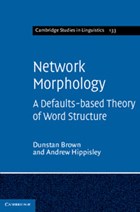Network Morphology
FAQs
DATR is a lexical knowledge representation language that is computable, and captures lexical knowledge in terms of default inheritance structures. A DATR description consists of a sequence of sentences corresponding semantically to a set of statements. These sentences are built up out of a small set of basic expression types, themselves built up out of sequences of lexical tokens (which are taken to be primitive). More information on DATR and how to implement it can be found at: http://www.datr.org.uk
There are two main types of default: normal case defaults and exceptional case defaults. The former are used for the general case that normally applies, whereas the latter are used as the last resort. The following analogy from Evans, Brown & Corbett (2002: 119) provides a useful non-linguistic example of this distinction: 'Mary and John both work for a firm based in London. Mary is the personnel manager and works in the office in London. Occasionally,she goes to Paris on a training course. By default,then,Mary works in the office in London. John is a salesman. He normally spends Mondays in the south of England, Tuesdays in the west, and Wednesdays and Thursdays in the north. If, however, a client cancels an appointment,or he has a problem with his car,or there is a department meeting, he goes to the office in London. On Fridays he often plays golf, but if it rains he goes to the office. By default, then, John also works in the office in London. Intuitively the two cases are rather different. Mary is 'normally' at the office, John is not. And yet at a higher level of abstraction the office is the default work place for both. It is these two types of default, both reasonable uses of the term, that have led to differences in usage in the literature, and to confusion. This is why we make the distinction: for Mary, working at the office in London is the normal case default, while for John, working in London is the exceptional case default.' Discussion of the contrast between these two types of default within linguistic systems can be found in Brown & Hippisley (2012: 83-106).
TOP


